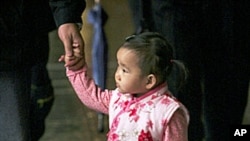Taiwan announced this week that its fertility rate had fallen below one baby per woman, worrying the government about its future supply of manpower and brain power. Taiwan’s rate of 0.9 is now the world’s lowest, but other developed Asian economies are close behind.
Taiwan’s fertility rate of 0.9 puts the island in the same league with other Asian territories that have industrialized and urbanized. The Chinese territory of Macau recorded a fertility rate of 0.92, and the next lowest rate belongs to Hong Kong at 1.07. Singapore, Japan and South Korea also have some of the world's lowest birthrates.
Officials in Taipei partly blame the Chinese zodiac calendar for the drop. 2010 was the Year of the Tiger, considered inauspicious for births.
But the drop is also part of a broader regional trend. A shift away from traditional rural lifestyles has allowed women easier access to university education and the time-consuming jobs that follow. Pricey childcare and later education in already-expensive Asian cities strain family budgets. Chinese people have traditionally preferred large families, but some say that, in Taiwan, Hong Kong and Singapore, career advancement has overtaken that goal.
Linda Arrigo is an American-born academic and a member of a non-governmental organization called the Population Association of Taiwan.
“Having been here in the 1960s as a teenager, I’ve seen this tremendous change from people wanting to have four or five children to now the young women I know, many of them say they want one or no children at all," Arrigo explained. "And it’s hard to understand the motivation except that professionals want a life of their own.”
She says equality between the sexes has made great strides in Taiwan and so women are more reluctant to give up the financial independence from their careers to stay at home.
"Young people’s motivations are so much changed. They say that having children is prohibitively expensive. They don’t want to spend the labor. They are also very much pressed in their professional jobs, as teachers, as computer programmers,” she said.
China, which slowed its rapidly growing population in the 1970s with the one-child policy, has seen fertility fall to 1.7 children per woman, slightly below the 2.1 considered ideal for replacement. But the population that already makes up a fifth of the world is still expected to grow because of greater life expectancy and a gradual easing of the one-child policy.
Asian governments have scrambled for answers as they fear population drops will lead to falling productivity, making businesses less competitive. Wai Ho Leong is a regional economist with Barclays Capital in Singapore.
“If you look at Korea, Taiwan and Singapore, the low birth rate is a key policy priority which they’re trying to address right now," Wai said. "To make matters worse, in all three countries, including China, there’s also an active aging dynamic that’s seeping into the workforce.
Less developed Asian countries have generally higher fertility rates and are expected to grow by about 7.3 percent this year, much more than their more urbanized and industrialized neighbors.
Wai Ho Leong says those numbers trouble officials in more developed nations, who are trying various schemes to overcome an aging workforce and lower productivity. “I think one policy that the Singaporeans have pursued is to open its doors to immigration and particularly the skilled migrants as a means to overcome low birth rates domestically. For less heterogeneous societies, like Taiwan, China, South Korea, the only way out is to deepen the skills intensity and the technology intensity of their economies,” Wai stated.
Singapore has also offered baby bonuses, including cash, since 2001 and business is booming in its fertility clinics. Japan has sought to safeguard its economy with more automation and by encouraging elders, women and foreigners to work. Taiwan is leaning toward subsidies and tax breaks to ease costs of education and childcare.




